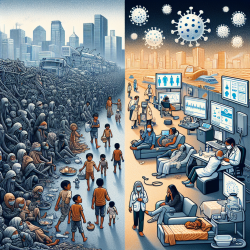Introduction
In the field of speech-language pathology, it is crucial to base interventions and strategies on solid research findings. A recent study titled African Americans’ Diminished Returns of Parental Education on Adolescents’ Depression and Suicide in the Adolescent Brain Cognitive Development (ABCD) Study provides valuable insights into the complex interplay between socioeconomic factors and adolescent mental health, particularly among African American adolescents. This blog aims to explore these findings and discuss how practitioners can leverage this knowledge to improve outcomes for children.
Key Findings
The study highlights a phenomenon known as Minorities’ Diminished Returns (MDRs), where the protective effects of parental education and marital status on adolescents’ mental health are less pronounced for African American adolescents compared to their White counterparts. Specifically, while higher parental education and marital status are generally associated with lower odds of depression and suicidal attempts, these benefits are not equally distributed across racial groups.
- Parental education was associated with lower odds of depressed mood (OR = 0.81; 95% CI = 0.67–0.99; p = 0.037) in the overall sample.
- Having married parents was linked to lower odds of suicidal attempts (OR = 0.50; 95% CI = 0.28–0.91; p = 0.022).
- The protective effects were significantly weaker for African American adolescents compared to White adolescents.
Implications for Practitioners
For speech-language pathologists and other practitioners working with adolescents, these findings underscore the importance of considering racial and socioeconomic contexts when designing interventions. Here are some practical steps to consider:
- Individualized Assessments: Conduct thorough assessments that consider the unique socioeconomic and racial backgrounds of each adolescent.
- Culturally Responsive Practices: Develop culturally responsive intervention strategies that address the specific needs and challenges faced by African American adolescents.
- Collaborative Efforts: Work closely with families, schools, and communities to create supportive environments that enhance the effectiveness of interventions.
- Advocacy and Education: Advocate for policies and programs that aim to reduce structural barriers and promote equity in educational and health outcomes.
Encouraging Further Research
While the study provides significant insights, it also highlights the need for further research to explore the mechanisms behind MDRs and develop effective interventions. Researchers are encouraged to investigate:
- The impact of other socioeconomic factors, such as income and occupational status, on adolescent mental health.
- The role of environmental and contextual factors, such as residential segregation and school quality, in shaping outcomes.
- Effective strategies to mitigate the effects of discrimination and enhance the benefits of parental education and marital status for African American families.
Conclusion
The study on African Americans’ diminished returns of parental education on adolescents’ depression and suicide offers critical insights for practitioners aiming to improve outcomes for children. By integrating these findings into practice and advocating for systemic changes, we can work towards a more equitable future for all adolescents.
To read the original research paper, please follow this link: African Americans’ Diminished Returns of Parental Education on Adolescents’ Depression and Suicide in the Adolescent Brain Cognitive Development (ABCD) Study.










